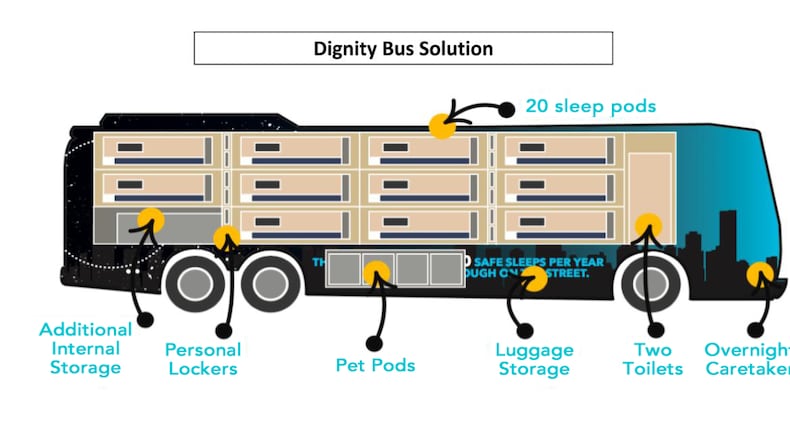DeAnna Shores, program coordinator for the coalition, made a presentation during Tuesday night’s City Council meeting. She said the buses would be available from 10 p.m. to 6 a.m. The buses would pick up the homeless at four locations in the city and park at undisclosed locations, Shores said.
The homeless would be dropped off in the morning at a location where breakfast and programming were provided, she said.
The coalition hopes to obtain three buses, one for men, one for women and one in case of overflow, Shores said. Each bus holds up to 20 people, she said.
The buses are specially-equipped with 20 sleeping pods, two toilets, personal lockers, luggage area and a place designated for pets. The buses would be cleaned daily, she said.
Shores said the company that makes the buses produces one every six weeks so Middletown could receive buses in November, December and January, she said.
The buses would be “a potential short-term solution to a long-term problem,” she said.
Not including the cost of the buses, Shores estimated the daily cost of providing the bus service at $10.16 per person.
City Manager Paul Lolli said housing the homeless would be addressed before winter.
Mayor Nicole Condrey said more efforts should be made to address the “root” causes of homelessness.
She called the buses “a small bandage on a bleeding artery.”
The buses would be the latest option to keep the homeless warm and safe during the winter. Last year, the city spent about $95,000 in grant money to fund a warming center for 90 days. The center, over a contract dispute with the city, closed after two months.
Condrey said she was frustrated that council never received any data obtained during in-take as promised.
“It blew up in our face,” Condrey said of the warming center that she supported. “I don’t think it went well.”
Homelessness has been issue in Middletown for decades, and despite the efforts of several agencies, it doesn’t seem to be improving.
Police Chief David Birk estimates there about 200 unhoused people living in Middletown and about 50% are from outside the city. He said many of the homeless come to Middletown from surrounding Butler County communities.
Council member Rodney Muterspaw, Middletown’s former police chief, dealt with homelessness for much of his career. He said some the unhoused are “dumped here” and he asked if the buses would invite more homeless to the city.
“Yes it will,” Condrey said.
Many of the homeless congregate downtown where most social services are located. Last year, in response to complaints from downtown business owners that loitering, panhandling and homeless issues were impacting their businesses, the city awarded a $49,724 grant to Downtown Middletown Inc. to provide six months of unarmed security downtown as a pilot program.
The contract was not renewed because Jeff Payne, executive director of DMI, didn’t give council enough time to vote on the legislation before the cancellation deadline.
Hope House, formerly located on Main Street, opened a $11.4 million homeless center for men at 1001 Grove St. The facility replaced the 150-year-old former U.S. Hotel and includes a 50-bed emergency shelter for men and 30 one-bedroom apartments for the chronically homeless, said Tim Williams, executive director of operations at Hope House Mission.
Before then-City Manager Jim Palenick signed a separation agreement with the city, he proposed spending more than $900,000 of the city’s American Rescue Plan Act funds to purchase 64 portable pallet homes that would provide the homeless a safe and comfortable transitional place to live and receive services.
That idea died after Palenick left the city.
For 18 years, many of the city’s homeless found shelter during the winter at Serving Homeless Alternate Lodging of Middletown (SHALOM), a church-based organization that receives no government financial assistance. SHALOM closed due to health concerns related to COVID-19 and this year, First United Methodist Church, 120 S. Broad St., where SHALOM’s office is located, has a new pastor.
It’s unclear whether SHALOM, which averaged about 35 clients a night, will reopen this year.
Vice Mayor Monica Nenni hopes council holds a work session to discuss ways the address the homeless issue and she encouraged residents to email council members their thoughts.
HOW TO CONTACT MIDDLETOWN CITY COUNCIL MEMBERS
Email addresses for all five council member and the clerk of council: nicolec@cityofmiddletown.org; monican@cityofmiddletown.org; talm@cityofmiddletown.org; rodneym@cityofmiddletown.org; zachf@cityofmiddletown.org; amys@cityofmiddletown.org
About the Author

